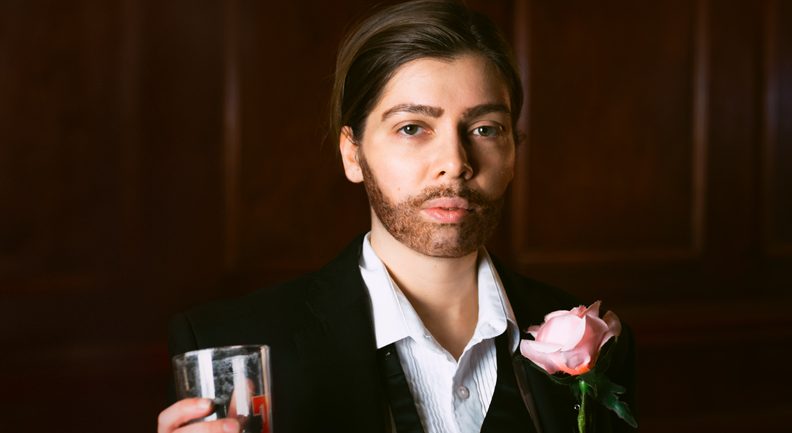Does everyone think they have the best dad in the world? Clearly, we’re not all so lucky. But Leyla Josephine takes all of the things we love to love about dads, all the things that make us smile or smirk indulgently, and all the things we might find mildly irksome in a dad, and packages them up with a sucker punch of a punchline in her latest show.
If you’ve not had the pleasure of seeing her before, Josephine is a performance poet, winning the UK National Poetry Slam at the Royal Albert Hall in 2014 against 99 other poets. (98, really, as she came joint first) She makes theatre, she teaches, she writes, she tours. All that, and she’s from Glasgow. Much of her work is autobiographical – and she says she hopes this helps others feel less alone – or feel less shame.
Daddy Drag sees Josephine don a fake tummy, a fake beard, and a proper dad vest and y-fronts. She hails us – after a shuffling volley of sniffing, grunting, crotch-scratching – with an ode to dads, delivered at machine-gun-fire speed at the mic, strutting in her beige pants. Offering a mere glimpse of the talent that won her the grand slam, her observations are witty, sharp, assured.
From there, she segways into dads. Lounging legs akimbo. Doing dad things. Fishing. Lord of the BBQ. Lager-swilling. And so we slide, without really noticing, into some far more precise observations about her own dad.
The show is carefully assembled from a conversation recorded between Josephine and her mum, sharing their memories about the dad/husband who always made them feel safe. Interspersed with the slow unravelling of the supposed reality, we see it peeling apart at the seams (along with the ingenious set) as we witness a young Leyla growing up. The soundtrack seduces us, before slapping us round the chops with the fish her dad presumably never caught. Benny Goodman‘s lighting design accentuates the disconcerting descent into reality.
The power of this show lies in its effortless seduction of the audience. Josephine is funny. She handles her audience participation as warmly and deftly as Jamie Wood. If you came to see comedy, you wouldn’t feel remotely cheated. But this is a kind of poetry, a kind of theatre. For it is a love letter to dads; a yowl of confusion when dads don’t behave as dads should. Above all, this is an adroitly handled performance that wrings all of the pathos out of this life depicted, without ever asking for pity.
“How do you make a show about a life?” Josephine asks. “You can’t even scratch the surface.” But if you have to condense the glory, the sordid shame, the pain and the befuddling love in a life into a single hour, this is a pretty compelling attempt.
